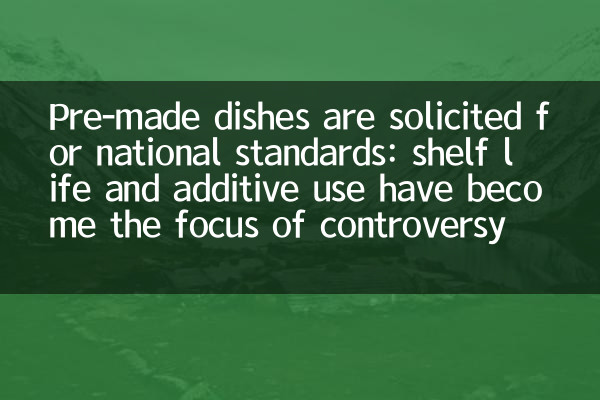Pre-made dishes are solicited for national standards: shelf life and additive use have become the focus of controversy
Recently, the draft for soliciting opinions on the national standards for pre-made dishes has sparked widespread discussion, among which the shelf life setting and the use of additives have become the focus of controversy. With the rapid development of the pre-made vegetable industry, consumers' attention to food safety and nutritional health continues to rise. The following is a structured analysis of this event based on the hot topics of the entire network in the past 10 days.
1. Current status and disputed background of pre-made vegetable market

According to data from the China Chain Business Association, the size of the pre-made vegetable market has exceeded 500 billion yuan in 2023, and the annual growth rate remains above 20%. However, while the industry is expanding rapidly, the problem of missing standards is becoming increasingly prominent:
| Controversy point | Consumers' concerns | Business Proposal |
|---|---|---|
| Shelf life length | The shelf life of more than 12 months affects nutritional value | Long shelf life is a necessity for logistics and distribution |
| Types of additives | Contains 15 types of additives such as preservatives and odor enhancers | Comply with current food safety standards |
| Identification specifications | No mandatory requirement for labeling of reheat loss | Existing nutrition labels have met regulatory requirements |
2. Statistics of opinions from all parties
Through monitoring of related topics on Weibo, Douyin and other platforms within 10 days, the following public opinion data were collected:
| platform | Discussion volume (10,000) | Main appeal | Support rate |
|---|---|---|---|
| 42.7 | Shorten shelf life | 68% | |
| Tik Tok | 35.2 | Reduce additives | 82% |
| Zhihu | 12.3 | Improve the logo | 91% |
3. Expert suggestions and technical solutions
Fan Zhihong, professor at the School of Food of China Agricultural University, proposed:"The pre-made dish standard should be established", it is recommended to be divided into three levels according to the shelf life:
| level | Shelf life | Additive limits | Applicable scenarios |
|---|---|---|---|
| Fresh food grade | ≤7 days | Disable preservatives | Supermarket fresh cold cabinet |
| Regular level | 1-6 months | Limited to use 5 types of additives | E-commerce channels |
| Emergency level | 6-12 months | Current standards | Special reserves |
4. Comparative analysis of international standards
Comparing the pre-made dishes standards in major countries, it can be seen:
| nation | Maximum shelf life | Limited quantity of additives | Special Requirements |
|---|---|---|---|
| China (draft for comments) | 12 months | Refer to GB2760 | none |
| Japan | 6 months | Strictly above international standards | Mark the date of pre-freezing |
| EU | 9 months | Disable some phosphate | Vitamin loss rate mark |
5. Industry development trend forecast
According to iMedia Consulting data, the pre-made vegetable market will show three major changes in 2024:
1.Technology upgrade: The proportion of enterprises that adopt new processes such as ultra-high pressure sterilization will increase from 15% to 32%
2.Standard differentiation: It is expected that there will be subdivided standards for special groups such as children and the elderly.
3.Strengthen supervision: Market supervision departments in many places have begun special sampling of pre-made vegetables, and the exposure rate of unqualified products has increased by 300%.
The solicitation of opinions will last until the end of August, and the National Standards Committee stated that it will improve the standard content based on feedback. Consumers can submit suggestions through email or log in to the official website to participate in the standard setting process.

check the details

check the details